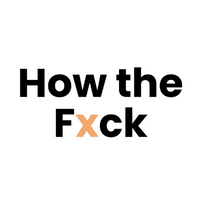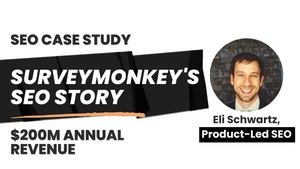Eli Schwartz joined SurveyMonkey in 2012. They’d been around a while and had venture funding, but had never invested in SEO.
In Eli’s own words:
“They were visible on the word survey. They were visible on the brand. But they were available in 16 languages, but weren't visible in any of those languages because they did not use serverside redirects on language pages. None of these pages were indexed. The survey pages, nothing. Their links were a mess...When I started there wasn't even a blog.”—Eli Schwartz, How the F*ck SEO Podcast
During his 7 years at the company, Eli developed and implemented his approach to search strategy: Product-Led SEO (get the book here).
A typical approach to SEO strategy might be to focus on middle and bottom-of-funnel keywords like “best survey makers” and “survey maker”—and to build topical clusters around those.
Of course, SurveyMonkey pursued that opportunity.
But, Eli’s product-led SEO strategy tapped into an almost infinite source of search traffic: prospect problems.
His strategy:
- Delved into prospective buyer pain points from user data
- Matched those pain points to keywords in tools
- Built content products to solve & serve intent
- Built a growth funnel around new leads
“Instead, by really focusing on the problem that users want to solve and that users were looking for, we now had hundreds and thousands of potential possibilities of pages. By the time I left, we never even finished that entire roadmap.”—Eli Schwartz, How the F*ck Podcast
And the results of this approach speak for themselves:
"By the time I left, we were generating an average $200 million a year in revenue sourced from organic search. I was there for seven years. So easily a billion dollars in revenue came from an organic channel [attributed]. Even though it is a SaaS B2B, most of the users behave like consumers. They pay for it on their own credit card and they expense it. Yes, they're using it at work, but it was cheap enough that they could just do it. Organic was the biggest driver of all growth.”—Eli Schwartz, How the F*ck Podcast
In this week’s SEO case study, we look at:
- What is product-led SEO?
- How did SurveyMonkey do product-led SEO?
- Other areas of content growth
- SurveyMonkey’s buyer funnel and creating the $200M annual revenue opportunity
- 3 examples of product-led SEO
Let’s dive in.
A Note on Branded Searches
The best available sources (below in Semrush), show SurveyMonkey to have between 1.5M and 2.5M monthly search visitors on average.
SurveyMonkey is a globally well-known brand. As expected, keyword tools show around 0.6M monthly searches come from brand searches.
It's worth noting that without great SEO, the website would not appear for branded searches.
However, for the rest of this case study, I’m going to focus on their content strategy for non-branded search traffic.
What is Product-Led SEO?
A typical SEO process would involve identifying keywords around your topic (“survey”), analyzing the SERPs for how to win it, and spending money to create content on that topic.
This process, as we all know, is expensive and doesn’t guarantee a ranking. Even then, that search term might not drive actual revenue results. In short, the ROI is not guaranteed.


